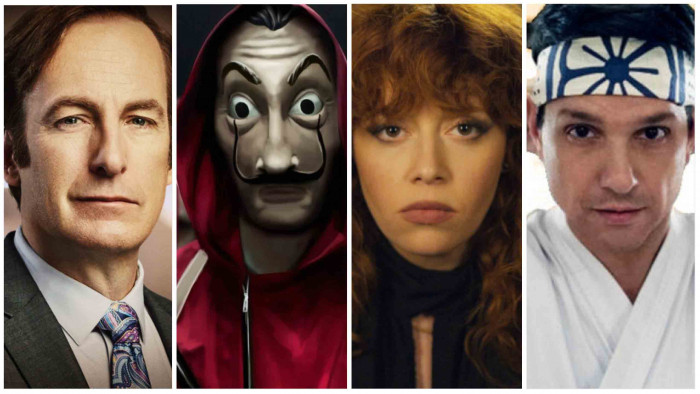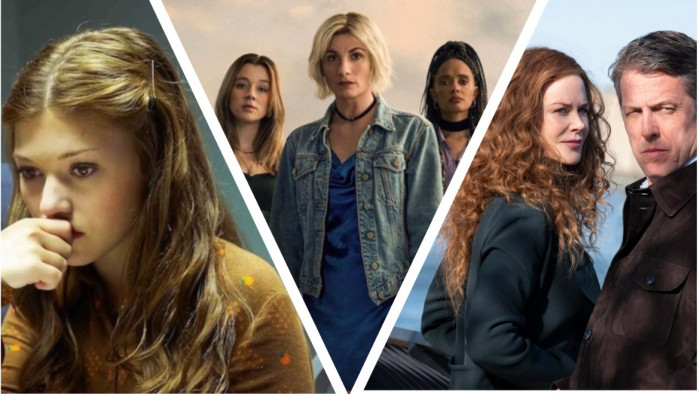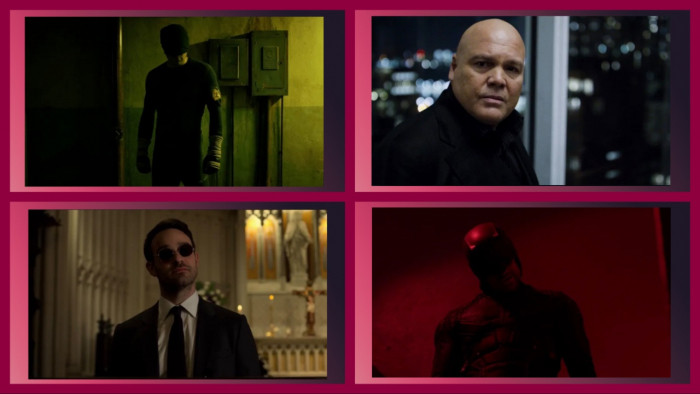"I won": Why 'Face Off' is unquestionably Breaking Bad’s greatest episode
It's over. Stop making television. This is it


This is the second article in our series My Favourite Episode, in which our writers pick out their single favourite episodes from classic shows – the episode they would show a friend to tell them what the show is all about. The first article was about The Sopranos’ ‘Pine Barrens’. This time it’s staff writer Ralph Jones, with Breaking Bad’s ‘Face Off’.
Come to me, come close to me. No no, please come closer than that. Sidle up ever so close to me. I want to tell you something. I wish to impart something of import. Let me clasp the edge of your ear with thumb and forefinger and let me…ssh…let me whisper something into the hole.
You will never write anything better than series four, episode thirteen of the hit AMC television show Breaking Bad.
There. The cold whoosh of truth. Yes, of course the tears sting. Of course the world you once imagined for yourself lies in extravagant flames. There is something particularly acrid about the smoke of disappointment. Oh, it stinks bad. Yes, when the same epiphany felled me, I too felt hollow. But an indispensable part of growing up is the realisation that you will never lift your puny, brittle frame above the bar so seamlessly set by Our Good Lord Vince Gilligan and his cluster of inexplicably gifted scribes. Never has this knowledge been more painfully evident than by the end of ‘Face Off’, the final episode of the greatest show in the history of this and perhaps any other world.
I am a heartless fiend, really. I am open to manipulation and suggestion, happy to be charmed and led astray by the biggest bastard around. I was a sitting duck, then, as soon as Bryan Cranston took off his shoes and walked into my living room in 2012. (This is a metaphor. This has never happened. But do you think that means I don’t dream of it?) From the moment I clapped eyes on the first episode, Cranston’s Walter White yanked me in and had me dangling like a prostrate, gormless fish. I felt sorry for this frustrated teacher; this 50-year-old middle-of-the-roader with beige clothes and tepid tastes. I loved witnessing the injection of vitality the cancer diagnosis pumped into his veins. And then, as the show developed, I felt an even more intense version of the feeling I experienced when I watched The Sopranos twice through: in every situation I was beginning to take the side of the show’s primary bellend – a man who, let’s not dress this up please, actually kills people. I couldn’t wait to defend him, an all-too-ready defensive tone creeping into my voice as I did so. I was happy when he won and angry when he lost. I was an apologist for Walter White.
And I loved it.
And this, assembled friends, dearly beloved, is why ‘Face Off’ – here it comes – why ‘Face Off’ – oh boy – why ‘Face Off’ – yeeeeeaaaaaaah, SAY IT – why ‘Face Off’ is the greatest episode of television ever made. It doesn’t just ask you – it convinces you – to root for a man who, with calculation and foresight, poisoned a small child with a pot plant. For little old television to pull off an act of such breathtaking moral audacity was unthinkable before Breaking Bad. While I recognise that I continued to blow Walt’s trumpet long after everyone else had thrown it into a lake, I do not believe those who professed to hate Walt while remaining ardent fans of the show. Liars, all of them. He may have waded into depths of evil no one could have imagined, but Walt – more specifically Walt refracted through a Bryan Cranston prism – remained admirable and likable to the last. That’s why people kept coming back. (That and Hank. Oh Hank, my sweet round prince.)
Let’s open the wrapper of this sweet episode. ‘Face Off’ begins and already the drum’s beating, the pulse is racing, and you’re swearing because you’ve raced to the sofa too quickly with a mug of tea in your hand and now it’s all over you, it’s all over your thumb and the sofa’s damp, oh, the sofa’s wet, that’s probably gonna stain. Walt watches Gus Fring, using what can only be a sixth sense, walk away from his car, which was on the verge of being obliterated by a bomb Walt had planted on its underside. After a superbly funny bit in which Walt carries the magnetic bomb into a hospital in a lady’s bag and tries to pry it off a metal door, he pleads with Jesse – sitting there because Brock has been poisoned – to think of a place where they could ambush Gus.
A pause there to reflect on the comic timing of Mr Bryan Lee Cranston. We don’t deserve Cranston, really. That’s the honest truth. We don’t deserve someone who can Serious Act and Funny Act as well as he. In addition to featuring some of the best moments of drama, ‘Face Off’ boasts the funniest scene in the entire show. After he smashes through a pane of glass in Saul Goodman’s office door, Walt finds himself being blackmailed by Saul’s secretary: give me $25,000 for the door and maybe I’ll tell you where to find Saul. The moment when Walt skids on broken glass and smashes into the door, before clambering gracelessly out of the gap at the bottom is a moment of sublime slapstick. We need no reminding that Walt is human but to be reminded that this genius can come so ludicrously unstuck is the lemon juice of light relief this particular televisual pancake needs.
At the police station, Saul frees Jesse from the cops who have been doing their utmost to implicate him in Brock’s poisoning. Gus occasionally visits Hector Salamanca at Casa Tranquila, Jesse tells Walt via Saul. Though Walt knows that Hector hates him, he realises that this hate is only surpassed by the hate he has for Gus. With this leverage, Walt convinces Hector to lay a trap: wheeled into and out of the DEA station, Hector will look to any casual observer – namely Tyrus, one of Gus’ henchmen – like he is ratting on Gus. (In reality, Hector has told Hank to suck his dick.) And so begins a quite exquisite dance as Walt pulls at strings with the precision and finesse of a master puppeteer. He lures Tyrus and then Gus to Casa Tranquila, knowing Tyrus will scan Hector’s room for wires and cameras but banking on him not checking the old man’s wheelchair too closely.
We are then granted, treated to, blessed with, arguably the most infamous scene in the show’s history. Gus, as cool as you like, an iceberg in the desert, enters the room. One last stand-off between two mortal enemies. Tyrus pulls out a syringe. Sitting close to Hector, the old man still looking at anything but Gus, Gus cradles the syringe and looks with contempt at his crippled foe. “One last chance to look at me, Hector.” The old man is obstinate, won’t budge. Gus leans in and glances at Hector before inserting the syringe. And, at the last, Hector looks straight at Gus. He face is flooded with what looks like remorse. This floors Gus – some kind of reconciliation, perhaps? A last-ditch olive branch? Nope. This look gives way to one of absolute fury, the last vestiges of Hector’s strength channelled into an expression of utter contempt and the furious ringing of his signature bell. He is rigged up to a bomb, Gus realises. With the first real display of emotion we can remember him conveying, Gus yells in horror, lifting himself instinctively out of his chair. But Walt knew; knew that Gus would fall for it; knew that he wouldn’t have enough time to get out. Cutting mid-scream, we are flung out to the corridor outside the room, into which the door and the room’s innards are blown with astonishing force. An alarm cries and debris lies strewn about the dusty floor.
And then Gus walks out.
He’s… he’s survived. The fucker has survived a bomb that must basically have blown up directly into his face. There is no killing this scuuuuuuuuumbag. Gilligan, this is implausible, buddy, whatcha playing at!?
We turn from profile to straight-on view of Gus’ f– oh. Ohhh yep. The bomb did blow up in his face. It blew up his face. Half of it has been ripped off, the right side of it now a red cavity. There is a huge gaping hole where his eye once was. Fuckoff this is gruesome and cool. Gus adjusts his tie: one last ceremonial gesture. A glazed look comes over him. He slumps to his knees. Dead. Dead at last. Gilligan, Sir, I take it back. That was entirely plausible.
In an airport parking lot, Walt smiles the most relieved smile of his life. (This is a man who was also told that his cancerous tumour had shrunk by 80%.) Free of the fear that Gus’ existence guaranteed, Walt simply kills the boss’ henchmen and with Jesse he burns down the meth lab. Jesse tells Walt on the top of the opening scene’s parking lot that Brock is recovering and that he was not accidentally poisoned with the ricin in Jesse’s cigarette pack. Apparently it was a common garden flower called Lily of the Valley?
A moment later, everything is coming up Walt, and our hero tells Skyler there is nothing to worry about anymore. “It’s over. We’re safe,” he says. “I won.” And, as ‘Black’ by Danger Mouse plays and Walt takes one final look at the Pollos Hermanos air freshener, that’s it, you think. That’s the end of the episode.
But then…
Oh boy.
Then comes the kicker – the zoom to beat all zooms hitherto and hereafter. The grandmother of all zooms. In Walt and Skyler’s back yard, the camera slowly takes us by the left hand towards an innocuous plant on the rockery. As its name becomes legible, a shiver runs down your body. “No…” you mutter, your palms clammy, your eye twitching. “Oh for the love of our holy Lord, no, dear God no.” But you’ve already realised. You know what’s happened. Walt made his mind up in the previous episode to poison Brock, when his spinning gun happened to point at the Lily of the Valley plant. Oh Walt. Oh Walt, man. You poisoned a child. You evil, brilliant weirdo.
The complexities of this entire charade don’t make me like Walt less; they make me like him more. A man who has such regard for planning, patience and symmetry isn’t a man to be loathed. He is a man to be admired. A show as smart as Breaking Bad needs and deserves a dickhead equally and spectacularly smart. He may be a mass murderer. But you know what? He has panache.
The beauty of episodes like this – and ‘Face Off’ is far from the only example – is that in their precision, their meticulous structure and their attention to detail they are reflections of Walt’s remarkable intellect. Good luck watching ‘Face Off’ and not sitting open-mouthed at the miraculous mechanics of the whole thing. Only a twisted pervert could engineer Gus’ murder and Brock’s poisoning in such a way, and only a twisted pervert could script them. We are lucky to live in the era we do; an era in which television is scripted by and populated by horrible and twisted perverts. Long may they reign over us.








